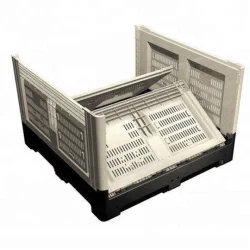Features and information about Intermediate Bulk Containers
2024-03-12
Intermediate Bulk Containers (IBCs) are large, reusable industrial containers designed for the storage, transport, and handling of bulk liquids and powders. IBCs provide an efficient and cost-effective solution for industries that deal with large quantities of materials. Here are some key features and information about Intermediate Bulk Containers:
Key Features:
1. Construction:
- IBCs typically consist of a plastic or metal container surrounded by a metal cage. The container is made of materials such as high-density polyethylene (HDPE) for plastic IBCs or stainless steel for metal IBCs.
2. Capacity:
- IBCs come in various capacities, commonly ranging from 275 to 330 gallons (1,000 to 1,250 liters). The design allows for the handling of large volumes of liquid or powder materials.
3. Shape and Design:
- The standard shape of an IBC is rectangular, allowing for efficient storage and transportation. The design includes features such as a discharge valve, vented lids, and often a pallet base for ease of handling with forklifts or pallet jacks.
4. Discharge Valve:
- IBCs are equipped with a built-in discharge valve or tap at the bottom, allowing for controlled dispensing of the contents. The valve can be designed for gravity flow or may include additional fittings for connecting hoses or pumps.
5. Top Access:
- IBCs typically have a large, top-opening for easy filling, inspection, and cleaning. The opening is often secured with a removable lid or cover.
6. Stackability:
- Many IBCs are designed to be stackable, both when empty and when filled. This feature helps maximize storage space during transportation and storage.
7. Collapsible Design:
- Some IBCs have a collapsible or foldable design, allowing them to be reduced in size when not in use. This feature is beneficial for efficient storage and return shipping.
8. Handling and Transportation:
- IBCs are equipped with lifting lugs or integral handles to facilitate handling with forklifts or other material handling equipment. The metal cage provides structural support and protection.
9. Reusable and Sustainable:
- IBCs are reusable, making them a sustainable option for industries that require bulk material handling. Reusing IBCs can help reduce waste and lower overall packaging costs.
Common Applications:
1. Chemical Industry:
- IBCs are widely used in the chemical industry for the storage and transport of various liquid chemicals and powders.
2. Food and Beverage Industry:
- IBCs are used for handling bulk quantities of food ingredients, syrups, and liquid food products.
3. Pharmaceutical Industry:
- IBCs are employed in the pharmaceutical sector for the storage and transportation of raw materials and intermediate products.
4. Cosmetics and Personal Care:
- IBCs are used to handle large quantities of liquid ingredients in the manufacturing of cosmetics and personal care products.
5. Agriculture:
- IBCs are utilized in agriculture for the storage and transport of liquid fertilizers, pesticides, and other agricultural chemicals.
6. Waste and Recycling:
- IBCs can be repurposed for waste collection and recycling purposes, especially in industries that generate large volumes of recyclable materials.
When using IBCs, it's essential to adhere to industry regulations, ensure proper cleaning and maintenance, and consider compatibility with the specific materials being stored or transported. The versatility and efficiency of IBCs make them a popular choice across various industries for bulk material handling.



